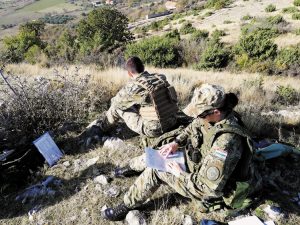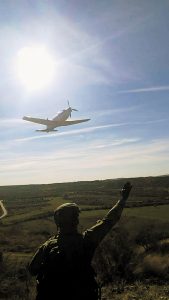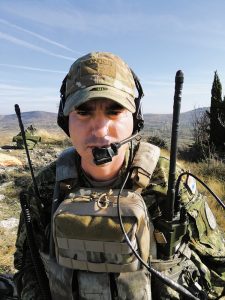The 2nd Mechanised Battalion “Pume“ (based in Našice) in early August welcomed new members for…
Selection Course for New JTACs
 In November, another selection course for Joint Terminal Attack Controllers (JTC) took place in the Croatian Armed Forces. Eleven people entered the selection process; for the first time, two women were among the candidates. The candidates came from the Guards Mechanized Brigade, the Mixed Artillery Regiment, the Croatian Army’s Training and Doctrine Command, the Directorate of Intelligence Affairs and the Special Forces Command. After having spent three weeks under the watchful eyes of their instructors, three candidates successfully passed the selection. Few people pass the course because specific skills are required of the candidates: excellent situational awareness, knowledge of topography and the understanding of the third dimension of warfare (airspace). Also, as the course is entirely conducted in English, the candidates must demonstrate excellent command of the language. They are also required to tolerate fatigue and stress, be proactive, work well in a team and be physically fit.
In November, another selection course for Joint Terminal Attack Controllers (JTC) took place in the Croatian Armed Forces. Eleven people entered the selection process; for the first time, two women were among the candidates. The candidates came from the Guards Mechanized Brigade, the Mixed Artillery Regiment, the Croatian Army’s Training and Doctrine Command, the Directorate of Intelligence Affairs and the Special Forces Command. After having spent three weeks under the watchful eyes of their instructors, three candidates successfully passed the selection. Few people pass the course because specific skills are required of the candidates: excellent situational awareness, knowledge of topography and the understanding of the third dimension of warfare (airspace). Also, as the course is entirely conducted in English, the candidates must demonstrate excellent command of the language. They are also required to tolerate fatigue and stress, be proactive, work well in a team and be physically fit.
The course was divided into three phases. The first phase was conducted in Barracks “Lt. Col. Mirko Vukušić” in Zemunik during the first week of the course and included lectures on tactics, techniques and procedures of Close Air Support (CAS), aircraft and their armaments as well as specialized devices used by the JTAC personnel. The candidates’ day began with exercise in basic combat gear (a protective vest and a gun), which was followed by a written exam on the subject matter from the previous day. In this way, the instructors received feedback on how much new subject matter in English each candidate could learn in a short period of time. As the theoretical training progressed, the understanding of the subject matter became more pronounced. The first week ended with a final exam on Sunday.
The beginning of the second week also marked the beginning of the second phase of the course. The candidates finally got a chance to go outdoors and demonstrate how well they could apply the knowledge they had gained in the previous week. The rules were clear: everything was monitored and evaluated, but the most important element was security, which the candidates were not allowed to overlook. The safety of pilots, friendly forces on the field and the civil population was in their hands. Although they did not control real aircraft in that phase, the insistence on security was real. In between simulated controls, they had an opportunity to listen to qualified and certified JTACs control PC-9M aircraft and OH-58D helicopters. The candidates who did not succeed in achieving a score of at least 80% on the final exam in the previous week wrote a correction exam on the following Saturday. The results were much better the second time around and the instructors, led by head instructor / evaluator Sergeant First Class Robert Zurak, selected the candidates who had acquired the theoretical and practical knowledge needed to progress into the third phase.
 The final phase was also the shortest one. It lasted only five days, but the candidates finally got an opportunity to direct real aircraft and the best candidates received their well-earned diplomas. However, this is not the end for them, but only the beginning. They now begin to study and acquire experience in CAS so that they may be ready for the certification procedure in Slovenia or the U.S. base in the Federal Republic of Germany. If they successfully complete the certification process and fulfil other conditions (STANAG 6001 result 3-3-3-2; a minimum number of flight controls following the requirements from NATO –ATP 3.3.2.2.; the completion of all tasks on the Mission Essential Task List; and a minimum grade 4 on the motor skills test), they may become certified JTACs and be recognized as such in NATO member countries.
The final phase was also the shortest one. It lasted only five days, but the candidates finally got an opportunity to direct real aircraft and the best candidates received their well-earned diplomas. However, this is not the end for them, but only the beginning. They now begin to study and acquire experience in CAS so that they may be ready for the certification procedure in Slovenia or the U.S. base in the Federal Republic of Germany. If they successfully complete the certification process and fulfil other conditions (STANAG 6001 result 3-3-3-2; a minimum number of flight controls following the requirements from NATO –ATP 3.3.2.2.; the completion of all tasks on the Mission Essential Task List; and a minimum grade 4 on the motor skills test), they may become certified JTACs and be recognized as such in NATO member countries.
Simultaneously with the selection course, one JTAC candidate was taking a preparatory course before the certification process, while another JTAC was going through an evaluation control after having returned from the certification process in Slovenia. Further, new CAS pilots were being trained on PC-9M aircraft and OH-58D Kiowa Warrior helicopters. For the first time in the Croatian Armed Forces, three types of aircraft flew in the same zone in a CAS scenario; the two previously mentioned aircraft were joined by ZLIN 242 L. More experienced JTACs flew on that aircraft so that they could get a better understanding of the pilot’s perspective, which in turn advanced their training.
In this way, the Croatian JTACs’ excellent collaboration with the Fixed-Wing Squadron and the Helicopter Squadron was continued. All training objectives were not only achieved, but surpassed. As their motto says, Croatian JTACs always go “above and beyond”.
 Sergeant First Class Robert Zurak, head JTAC instructor and evaluator
Sergeant First Class Robert Zurak, head JTAC instructor and evaluator
For the selection course to be successful, clear objectives have to be defined. However, in order to define those objectives, we need to know what we want, i.e. JTAC instructors must be familiar with the needs of the Croatian Armed Forces and the direction in which the CAS is developing within NATO. In accordance with that, the aim of the selection course is to select candidates who will be capable of responding to the demands of modern warfare and securing the continuation of the JTAC programme in the Croatian Armed Forces. The Croatian JTAC has to be capable of neutralizing the opponent using advanced armament systems in all weather conditions. Because of that, excellence is demanded in the selection course. The path from the selection process to the status of a qualified JTAC is a long and toilsome one. The training is rigorous and selective; only the best ones can succeed in it. However, the acquired values and knowledge last a lifetime.
Text by MARIJAN TURKALJ
Photo by JTAC
